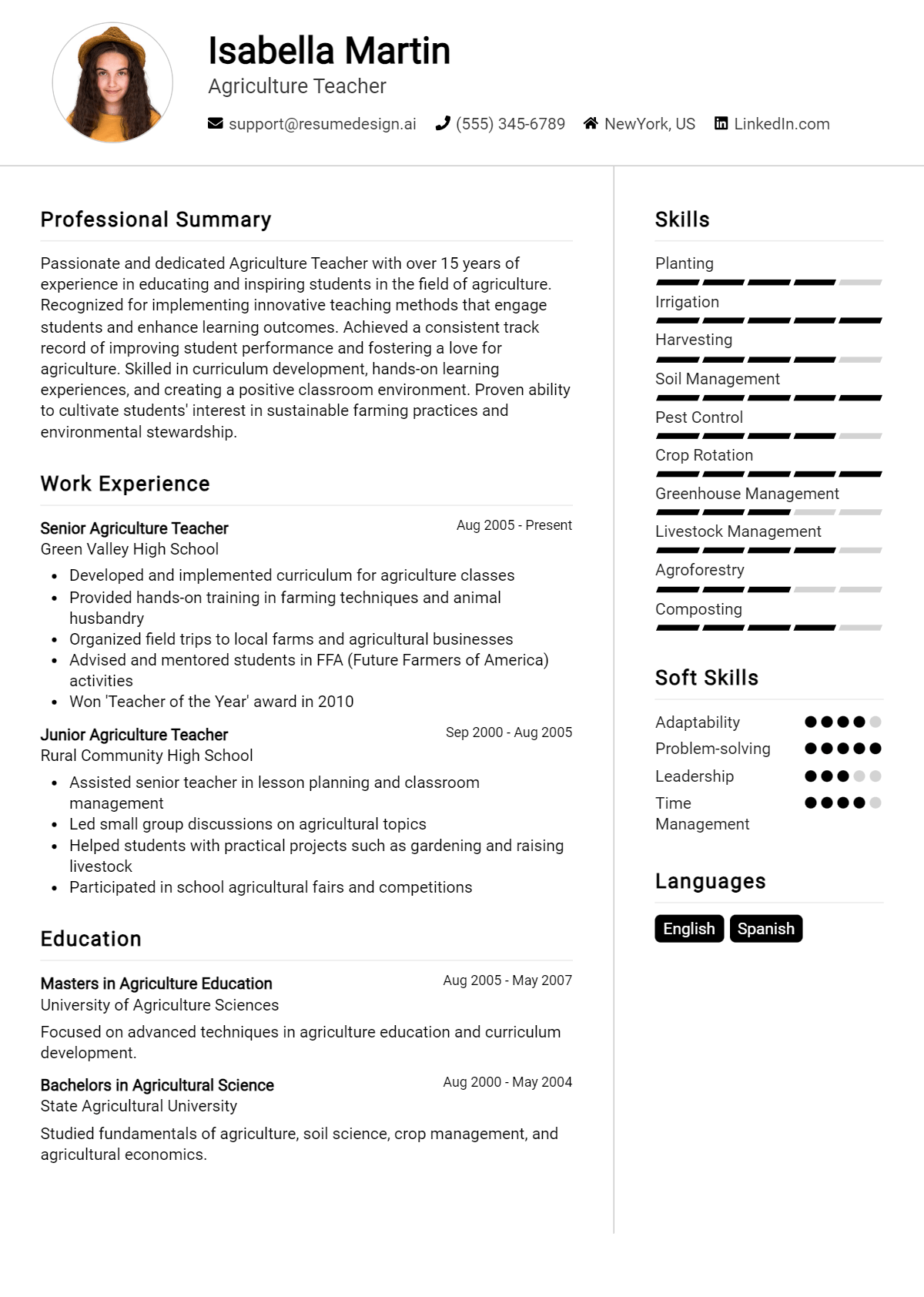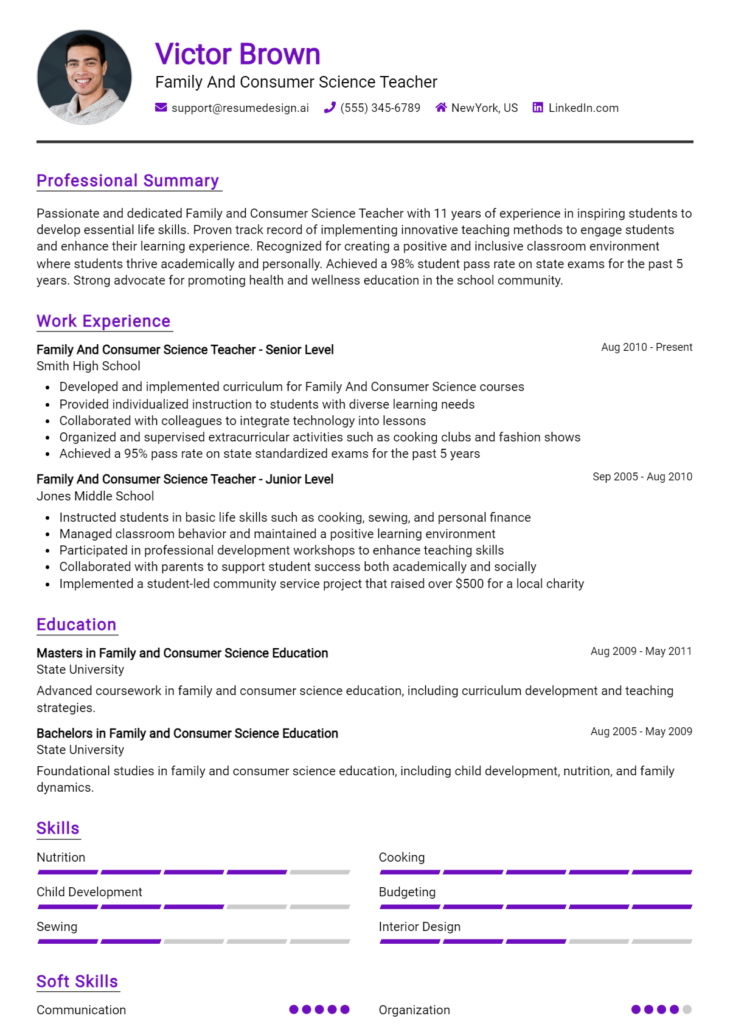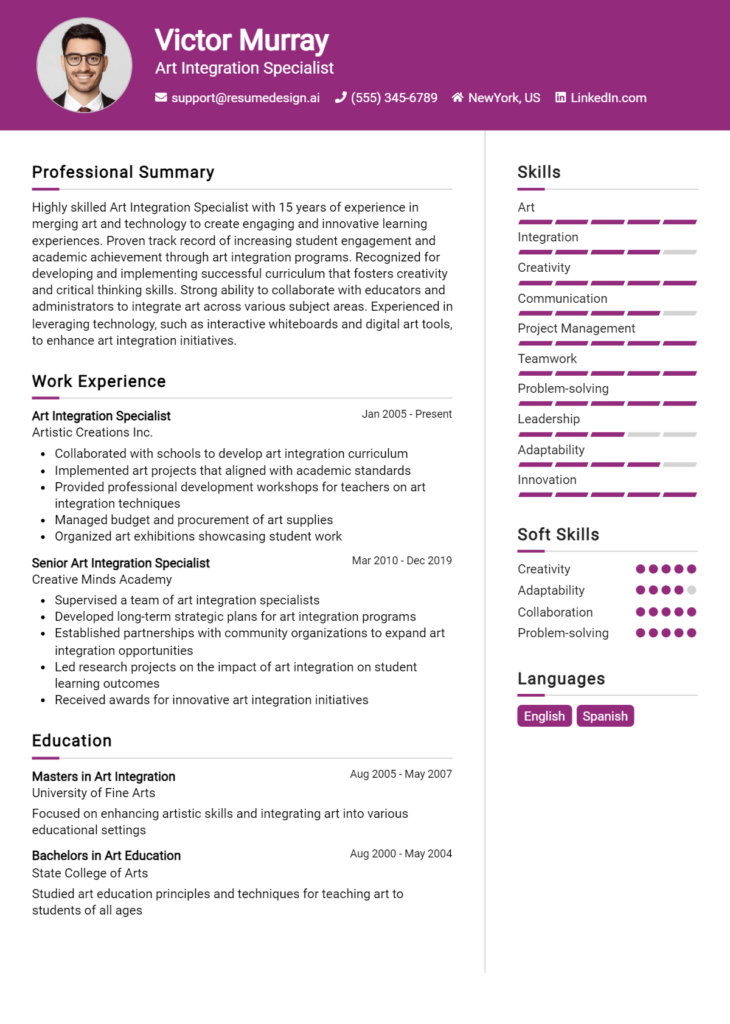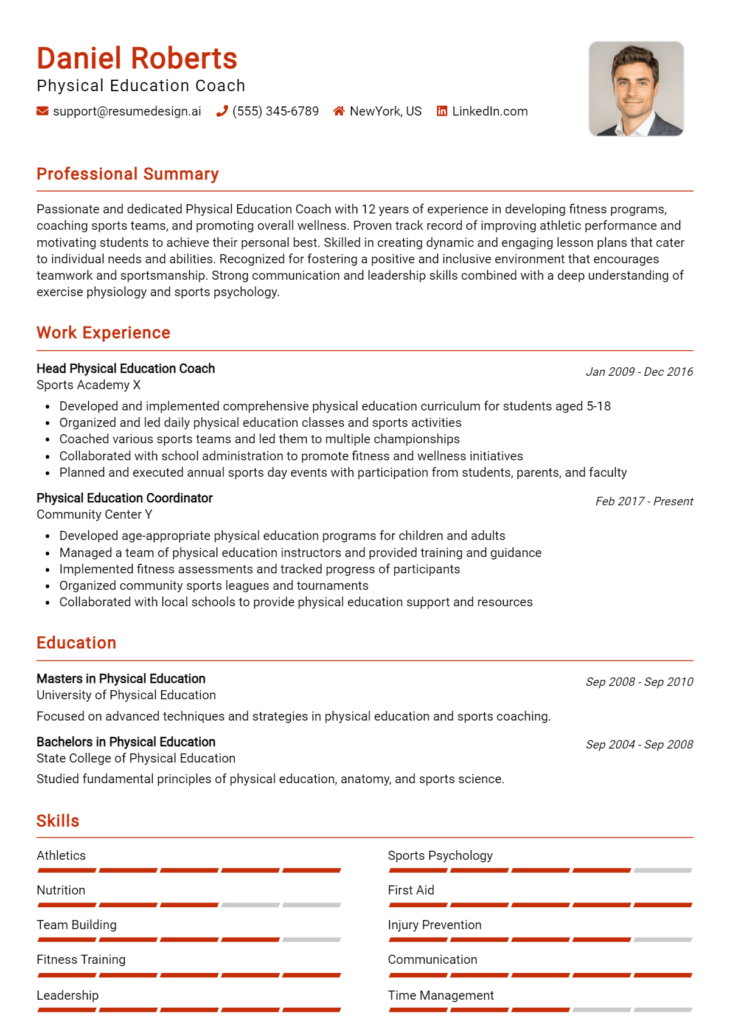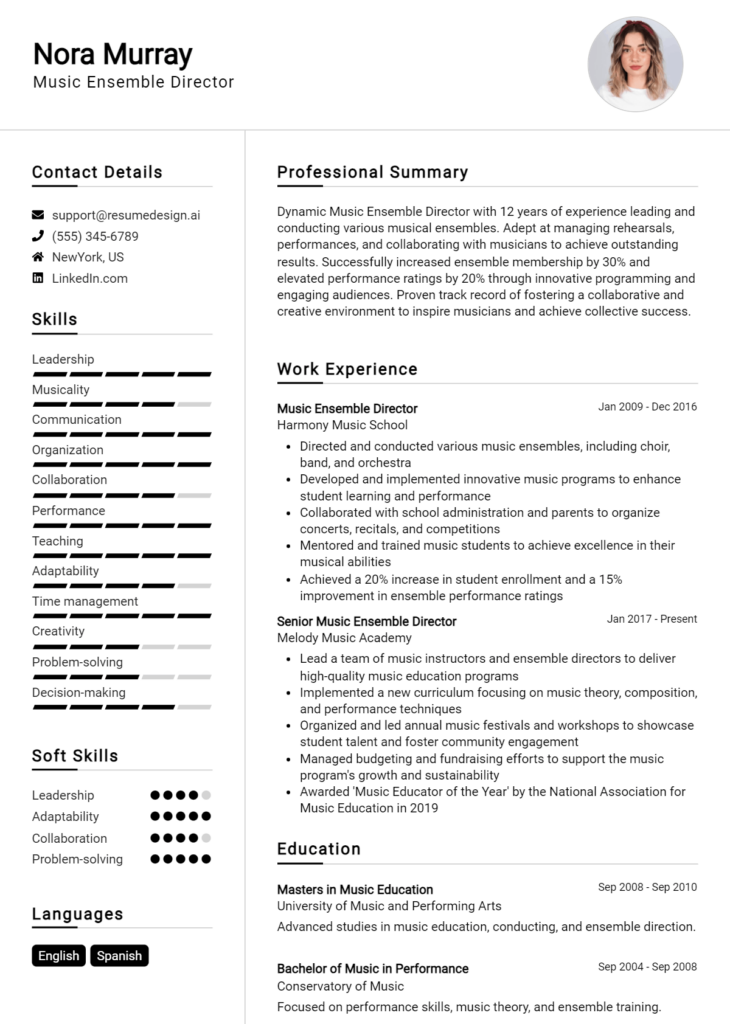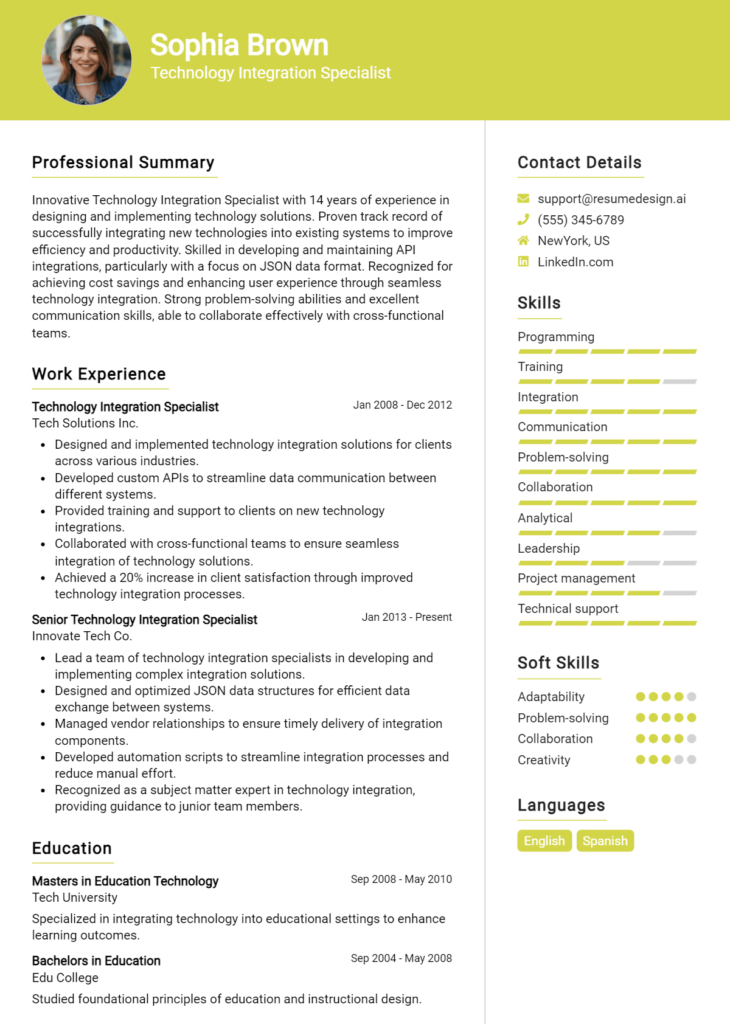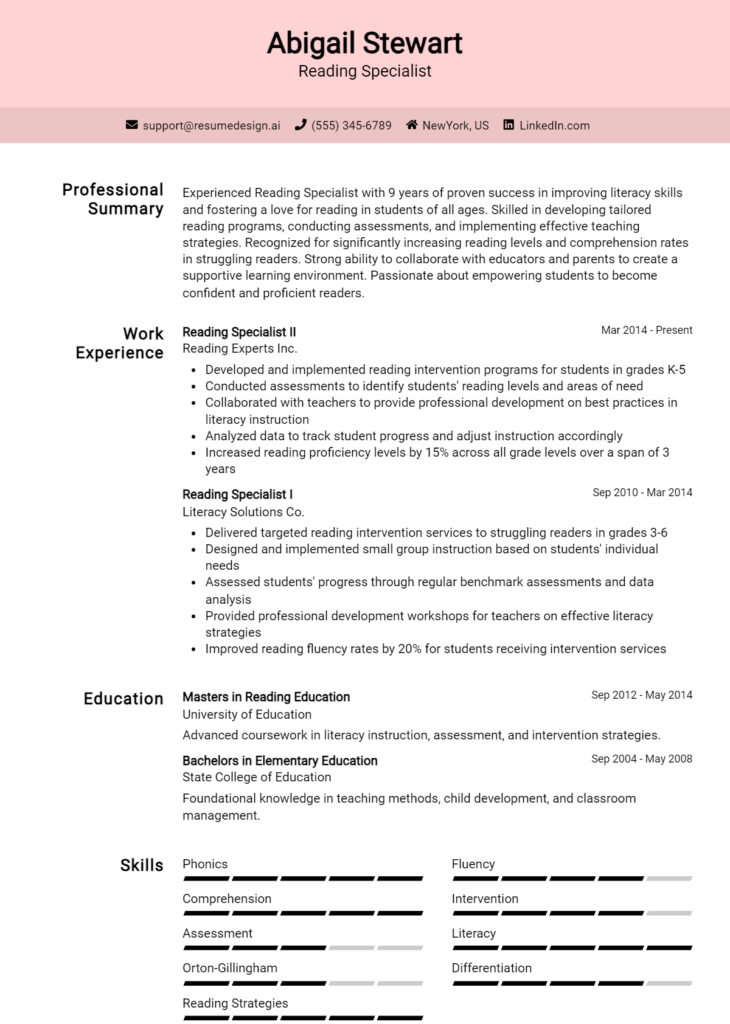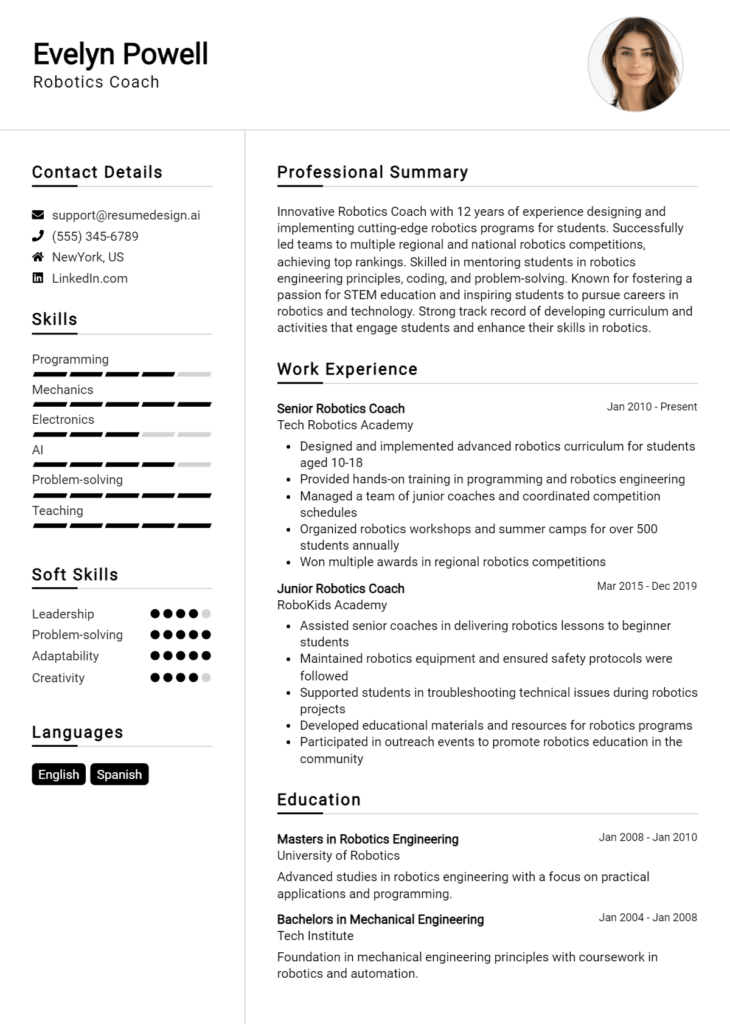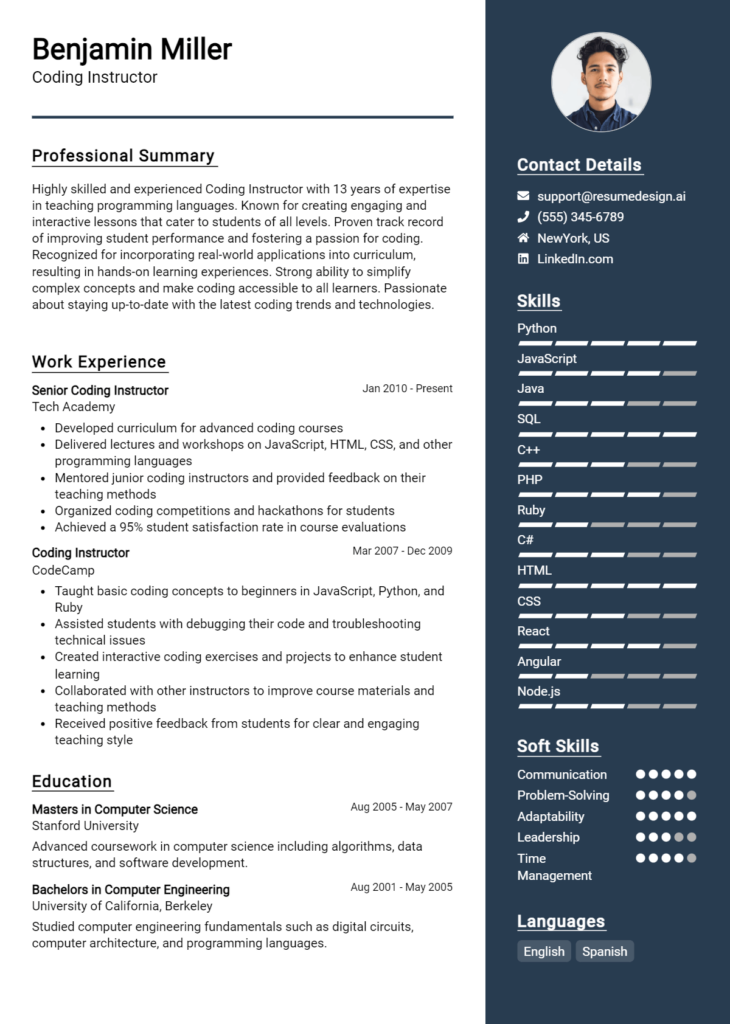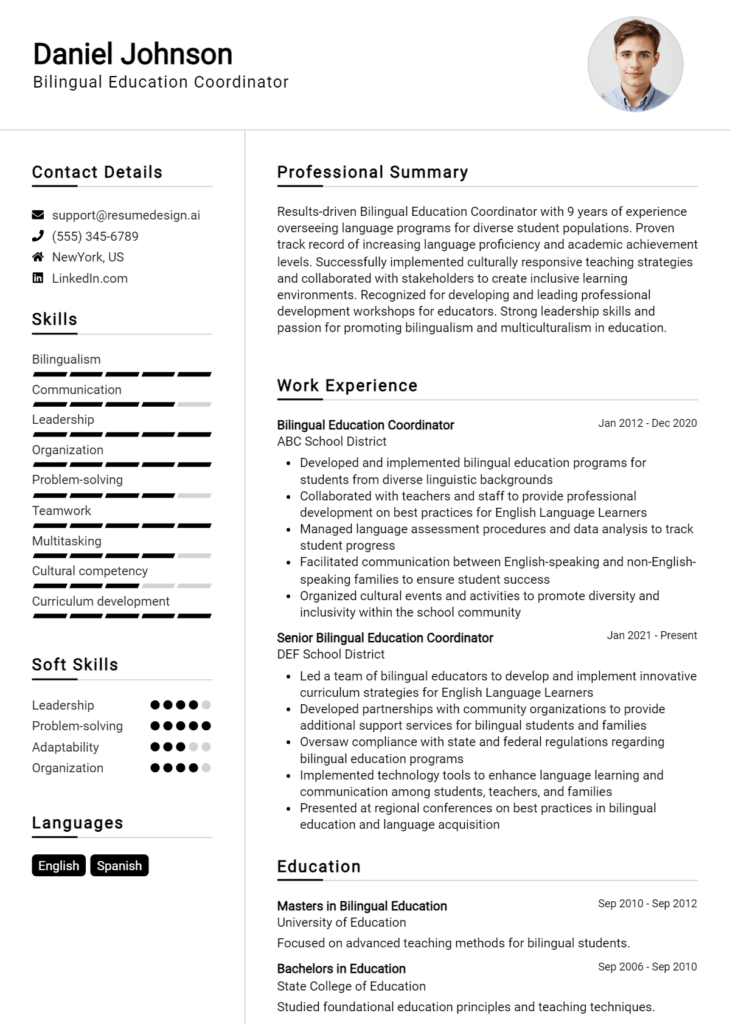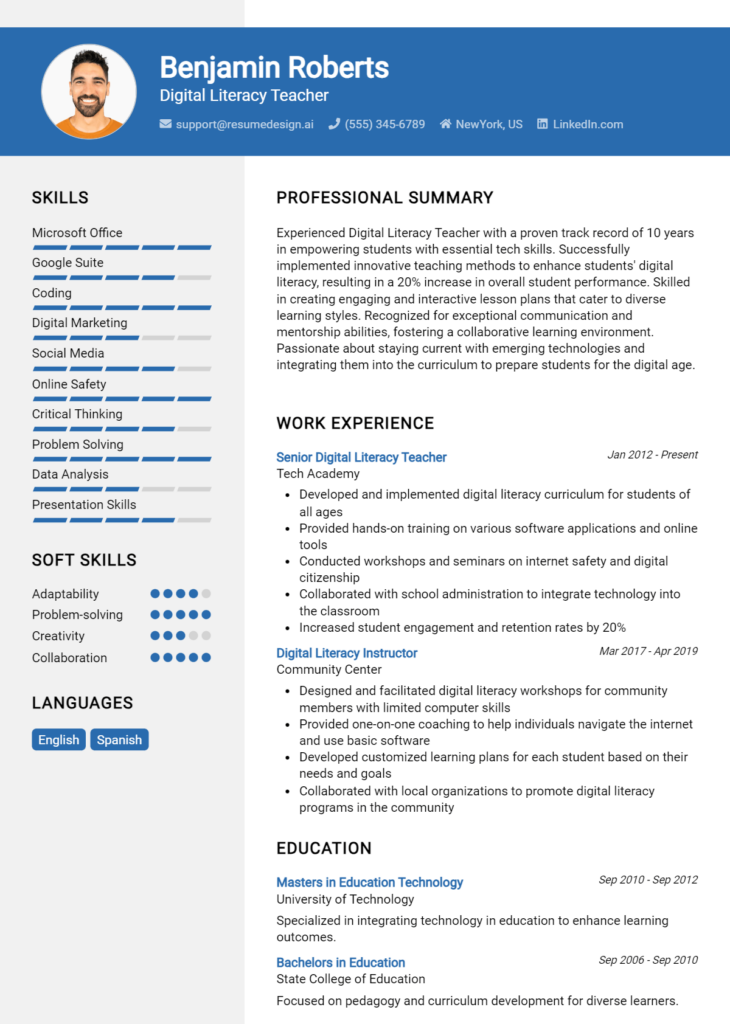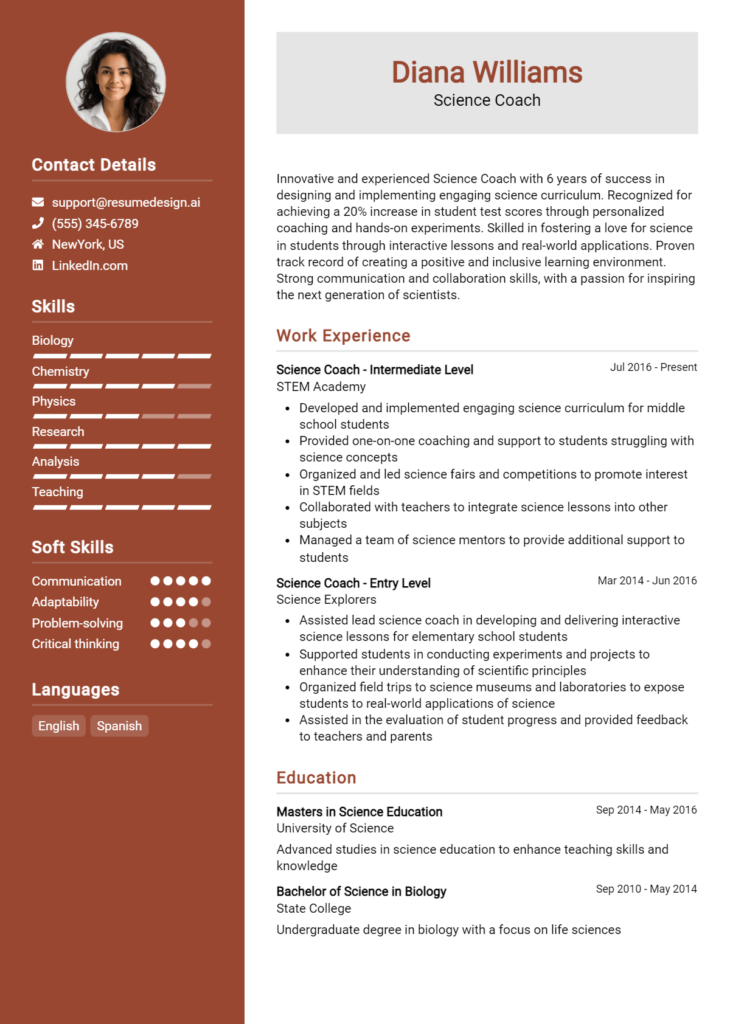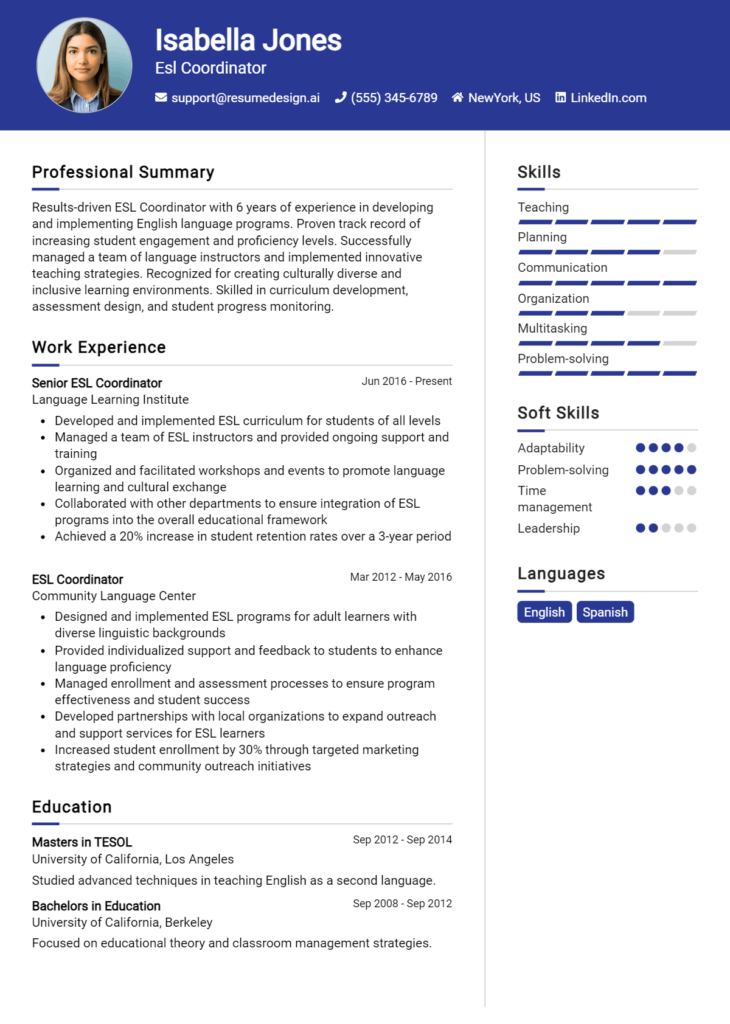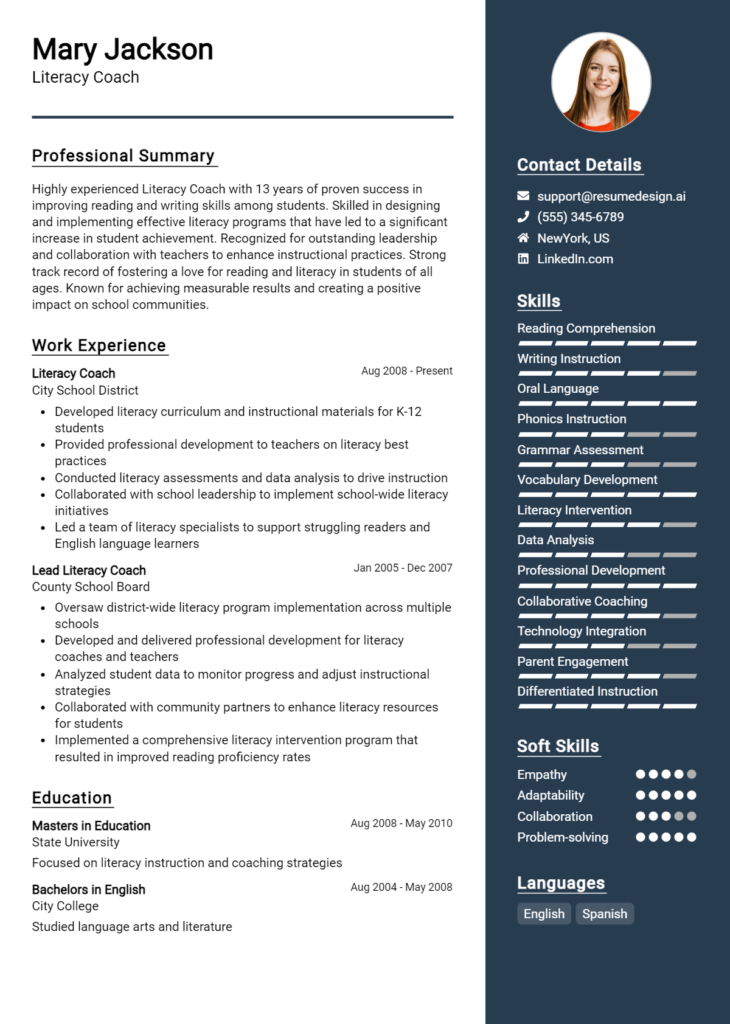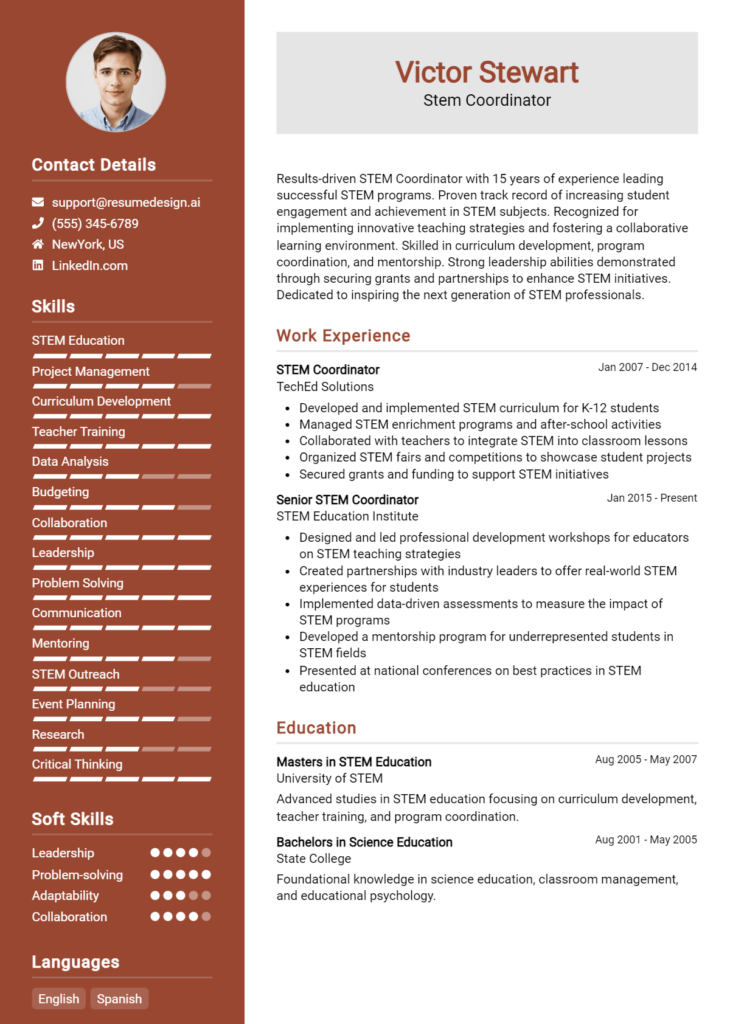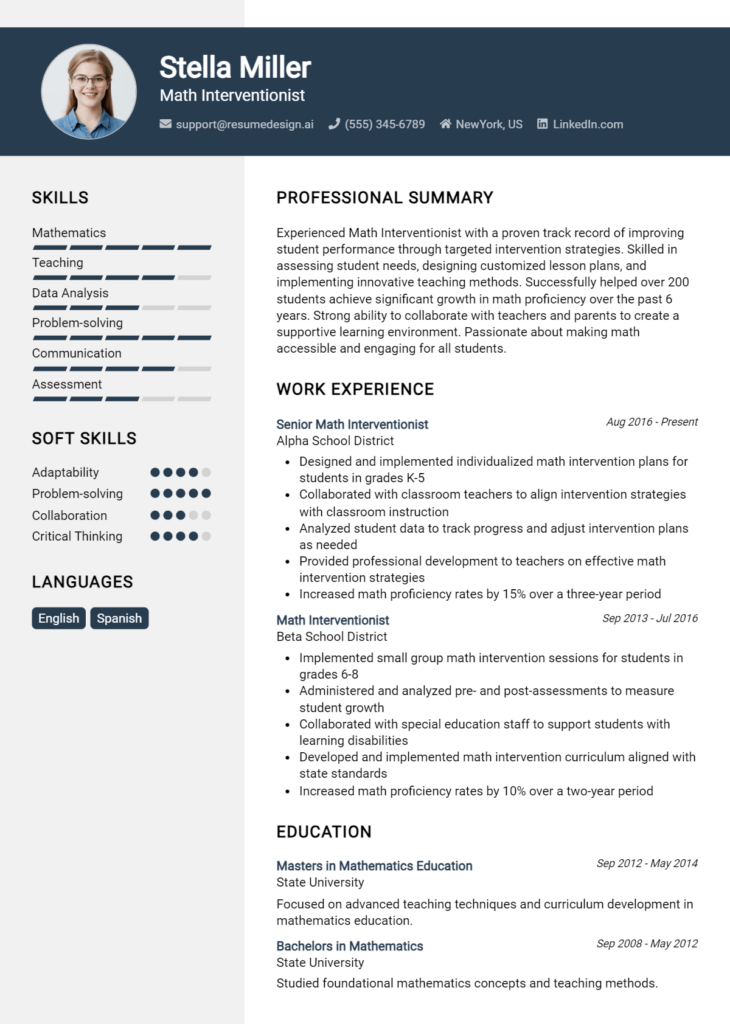Agriculture Teacher Core Responsibilities
An Agriculture Teacher plays a pivotal role in educating students about agricultural sciences, bridging the gap between theoretical knowledge and practical application. Key responsibilities include developing curriculum, conducting hands-on training, and assessing student performance. Essential skills encompass technical knowledge of farming practices, operational management, and strong problem-solving abilities to address challenges in agriculture. These competencies not only enhance student learning but also align with the organization's overall goals. A well-structured resume can effectively highlight these qualifications and demonstrate the candidate's value to potential employers.
Common Responsibilities Listed on Agriculture Teacher Resume
- Develop and implement engaging agricultural curriculum and lesson plans.
- Conduct hands-on training sessions in various agricultural practices.
- Assess and evaluate student performance and progress.
- Coordinate field trips and practical learning experiences.
- Engage with local agricultural communities and industry professionals.
- Facilitate discussions on sustainable farming and environmental stewardship.
- Advise students on career paths in agriculture and related fields.
- Maintain equipment and ensure safety standards in the classroom and lab.
- Integrate technology into teaching methods and student projects.
- Collaborate with other departments to enhance interdisciplinary learning.
- Organize and participate in agricultural fairs and competitions.
- Stay updated on the latest agricultural trends and innovations.
High-Level Resume Tips for Agriculture Teacher Professionals
In the competitive field of education, a well-crafted resume is crucial for Agriculture Teacher professionals seeking to make a lasting first impression on potential employers. Your resume serves as the initial point of contact, often determining whether you advance to the interview stage. It must effectively showcase your unique skills, relevant experience, and notable achievements in agriculture education. A strong resume not only highlights your qualifications but also reflects your passion for teaching and commitment to agricultural development. This guide will provide practical and actionable resume tips specifically tailored for Agriculture Teacher professionals, ensuring that you stand out in a crowded job market.
Top Resume Tips for Agriculture Teacher Professionals
- Tailor your resume to the specific job description by using keywords and phrases that align with the requirements of the position.
- Highlight relevant teaching experience, including internships, volunteer work, and part-time positions in agriculture education.
- Quantify your achievements with specific metrics, such as the number of students taught, program growth percentages, or successful projects led.
- Emphasize industry-specific skills, such as knowledge of sustainable farming practices, agricultural technology, or curriculum development.
- Incorporate relevant certifications, such as agricultural education credentials or specialized training in horticulture or livestock management.
- Showcase any leadership roles or committee involvement within educational institutions or agricultural organizations.
- Utilize a clean, professional format that enhances readability and ensures that key information stands out.
- Include a section on professional development to demonstrate your commitment to continuous learning and improvement in the agriculture field.
- Use action verbs to describe your responsibilities and accomplishments, creating a dynamic and engaging narrative of your career.
- Proofread your resume thoroughly to eliminate any grammatical errors or typos, ensuring a polished and professional presentation.
By implementing these tips into your resume, you significantly enhance your chances of landing a job in the Agriculture Teacher field. A well-structured and tailored resume not only presents your qualifications effectively but also demonstrates your dedication to the profession, making you a more attractive candidate to potential employers.
Why Resume Headlines & Titles are Important for Agriculture Teacher
In the competitive field of education, particularly in specialized areas like agriculture, a well-crafted resume headline or title can make a significant difference in capturing the attention of hiring managers. A strong headline serves as a powerful summary of a candidate's key qualifications and teaching philosophy, allowing them to stand out in a crowded applicant pool. It should be concise, relevant, and directly related to the job being applied for, providing an immediate snapshot of the candidate’s expertise and passion for agriculture education. This initial impression can be crucial in determining whether a hiring manager will delve deeper into the resume or move on to the next applicant.
Best Practices for Crafting Resume Headlines for Agriculture Teacher
- Be Concise: Limit your headline to one impactful sentence that summarizes your qualifications.
- Be Specific: Tailor the headline to reflect the specific agriculture teaching position you are applying for.
- Highlight Key Skills: Incorporate essential skills or certifications relevant to agriculture education.
- Showcase Experience: Mention years of experience or accomplishments that set you apart from other candidates.
- Use Action Words: Start with strong action verbs to convey enthusiasm and a proactive approach.
- Focus on Impact: Consider how your teaching style or achievements have positively influenced students or programs.
- Avoid Jargon: Use clear and straightforward language to ensure your headline is easily understood.
- Reflect Your Passion: Infuse your headline with your commitment to agricultural education and student development.
Example Resume Headlines for Agriculture Teacher
Strong Resume Headlines
Dynamic Agriculture Teacher with 10+ Years of Experience in Hands-On Learning and Student Engagement
Innovative Educator Specializing in Sustainable Agriculture Practices and Curriculum Development
Passionate Agriculture Teacher Dedicated to Fostering Future Leaders in Agricultural Sciences
Weak Resume Headlines
Teacher Looking for Job
Agriculture Specialist
Strong headlines are effective because they communicate a clear and compelling narrative about the candidate's strengths and experiences, making it easy for hiring managers to recognize their suitability for the role. In contrast, weak headlines fail to impress because they are vague and non-specific, lacking the essential information that would help a candidate stand out. By avoiding generic phrases and instead focusing on impactful, role-specific language, candidates can create a powerful first impression that invites further exploration of their qualifications.
Writing an Exceptional Agriculture Teacher Resume Summary
A well-crafted resume summary is crucial for an Agriculture Teacher as it serves as the first impression to potential employers. This brief paragraph provides a snapshot of the candidate's qualifications, highlighting key skills, relevant experience, and noteworthy accomplishments. A strong summary can quickly capture the attention of hiring managers, making it easier for them to recognize the candidate's fit for the position. By being concise and impactful, the summary sets the tone for the rest of the resume and should be tailored specifically to the job being applied for, ensuring it aligns with the employer's needs and expectations.
Best Practices for Writing a Agriculture Teacher Resume Summary
- Quantify achievements: Use numbers and statistics to showcase your contributions and impact.
- Focus on relevant skills: Highlight skills that are directly related to teaching agriculture, such as curriculum development and student engagement.
- Tailor your summary: Customize the summary for each job application, reflecting the specific requirements mentioned in the job description.
- Keep it concise: Aim for 2-4 sentences that deliver maximum impact without overwhelming the reader.
- Showcase your passion: Convey your enthusiasm for teaching and agriculture, which can resonate with hiring managers.
- Use action verbs: Start sentences with strong action verbs to demonstrate your proactive approach and capabilities.
- Highlight professional development: Mention any relevant certifications, training, or workshops that enhance your qualifications.
- Include teaching methodologies: Reference specific teaching techniques or methodologies that align with modern agricultural education practices.
Example Agriculture Teacher Resume Summaries
Strong Resume Summaries
Dedicated Agriculture Teacher with over 5 years of experience in developing engaging curricula that increased student participation by 30%. Proficient in hands-on teaching methods with a focus on sustainable farming practices and technology integration.
Results-driven educator with a Master's degree in Agricultural Education and a proven track record of leading award-winning student projects. Skilled in fostering collaborative learning environments and enhancing student performance through innovative instructional strategies.
Passionate Agriculture Teacher with expertise in both classroom and field instruction, successfully improving student learning outcomes by 25% over three years. Recognized for implementing community-based agricultural programs that promote environmental stewardship and food security.
Weak Resume Summaries
Experienced teacher looking for a job in agriculture education. I have taught many students.
Agriculture enthusiast with teaching experience seeking a position in a school. I am dedicated and hardworking.
The strong resume summaries effectively highlight specific achievements, quantify results, and emphasize relevant skills that align closely with the role of an Agriculture Teacher. They provide concrete evidence of the candidate's impact and capabilities. In contrast, the weak summaries lack detail, fail to quantify outcomes, and come across as generic, making it difficult for hiring managers to assess the candidate's qualifications or potential contributions to their institution.
Work Experience Section for Agriculture Teacher Resume
The work experience section of an Agriculture Teacher resume is vital as it highlights the candidate's practical expertise and showcases their ability to teach essential agricultural concepts effectively. This section not only reflects the technical skills acquired through hands-on experience but also emphasizes the candidate's capacity to manage classroom dynamics, lead projects, and deliver high-quality educational outcomes. By quantifying achievements and aligning experiences with industry standards, candidates can demonstrate their preparedness to contribute meaningfully to educational institutions and the agricultural sector at large.
Best Practices for Agriculture Teacher Work Experience
- Highlight specific technical skills related to agriculture, such as crop management, soil science, and sustainable practices.
- Quantify achievements with metrics, such as improved student performance percentages or project completion rates.
- Include examples of leading teams or projects that illustrate leadership and collaboration.
- Align your experiences with industry standards and educational requirements to showcase relevance.
- Describe innovative teaching methods used and their impact on student engagement and understanding.
- Incorporate any professional development or certifications that enhance your technical capabilities.
Example Work Experiences for Agriculture Teacher
Strong Experiences
- Developed a hands-on agricultural science curriculum that increased student engagement by 30% and resulted in a 20% improvement in assessment scores over two academic years.
- Led a team of 5 students to design and implement a sustainable community garden project, producing over 500 pounds of organic produce for local food banks.
- Organized and facilitated workshops on precision farming techniques, attracting over 100 participants and receiving positive feedback from 90% of attendees.
- Collaborated with local agricultural businesses to provide students with internship opportunities, resulting in 15 job placements in the agricultural sector.
Weak Experiences
- Taught various agriculture classes without specifying the subjects or any notable outcomes.
- Participated in school events related to agriculture, but did not detail any specific contributions or results achieved.
- Assisted in the management of the school farm, with no mention of specific responsibilities or skills developed.
- Worked with students on projects without describing the projects or any measurable impact on student learning.
The examples listed as strong experiences are considered impactful because they provide clear, quantifiable outcomes and demonstrate the candidate's technical leadership and collaborative efforts. They showcase specific achievements that align with industry standards and highlight the candidate's ability to enhance student learning. In contrast, the weak experiences lack detail and measurable results, making them less compelling and failing to convey the candidate's true capabilities and contributions to the educational environment.
Education and Certifications Section for Agriculture Teacher Resume
The education and certifications section of an Agriculture Teacher resume plays a critical role in showcasing the candidate's academic background and commitment to ongoing professional development. This section not only highlights the degrees attained and the specialized certifications earned but also emphasizes the candidate's dedication to continuous learning and staying current in the agricultural field. By providing relevant coursework, industry-recognized credentials, and any specialized training, candidates can significantly enhance their credibility and align themselves with the specific requirements of the job role, making them more attractive to prospective employers.
Best Practices for Agriculture Teacher Education and Certifications
- Include only relevant degrees and certifications that directly pertain to agriculture and education.
- List your educational qualifications in reverse chronological order, starting with the most recent.
- Highlight any advanced degrees or credentials that demonstrate a higher level of expertise.
- Incorporate specific coursework that aligns with agricultural education, such as agronomy, animal science, or plant biology.
- Showcase industry-recognized certifications, like Certified Agriculture Teacher (CAT) or similar credentials.
- Detail any specialized training programs or workshops attended that enhance your teaching capabilities.
- Use clear and concise language to maintain readability and professionalism.
- Consider including GPA or honors if they are particularly impressive and relevant to the teaching role.
Example Education and Certifications for Agriculture Teacher
Strong Examples
- Bachelor of Science in Agricultural Education, University of Agriculture, 2020
- Certified Agriculture Teacher (CAT), National Association of Agricultural Educators, 2021
- Relevant Coursework: Agronomy, Soil Science, Animal Husbandry, and Environmental Sustainability
- Completed Professional Development Workshop on Modern Farming Techniques, 2022
Weak Examples
- Associate's Degree in General Studies, Community College, 2015
- Certification in Basic Computer Skills, 2018
- High School Diploma, 2010
- Outdated certification in Horticulture, 2016
The examples are considered strong because they directly relate to the qualifications and skills necessary for an Agriculture Teacher role, showcasing relevant degrees, certifications, and coursework that reflect the candidate’s specialized knowledge and commitment to the field. In contrast, the weak examples highlight educational qualifications and certifications that are either outdated, irrelevant to agricultural education, or do not demonstrate the necessary expertise expected for the position, thereby diminishing the candidate's potential appeal to employers.
Top Skills & Keywords for Agriculture Teacher Resume
An effective resume for an Agriculture Teacher must highlight a blend of both hard and soft skills that demonstrate the candidate's proficiency in the field and their ability to connect with students. Skills are crucial as they provide a snapshot of the teacher's capabilities, showcasing not only their technical knowledge of agricultural practices but also their interpersonal and communication abilities that foster a positive learning environment. A well-crafted resume that emphasizes these skills can significantly increase the chances of landing an interview.
Top Hard & Soft Skills for Agriculture Teacher
Soft Skills
- Communication Skills
- Leadership Abilities
- Patience and Empathy
- Team Collaboration
- Problem-Solving Skills
- Time Management
- Adaptability
- Creativity in Teaching Methods
- Conflict Resolution
- Motivation and Encouragement of Students
Hard Skills
- Knowledge of Agricultural Science and Techniques
- Curriculum Development
- Classroom Management
- Agricultural Technology Proficiency
- Soil Science Expertise
- Crop and Livestock Management
- Safety Regulations and Compliance
- Project-Based Learning Implementation
- Data Analysis and Research Skills
- Familiarity with Sustainable Practices
By emphasizing these skills and demonstrating relevant work experience, candidates can create a compelling resume that effectively showcases their qualifications for the role of Agriculture Teacher.
Stand Out with a Winning Agriculture Teacher Cover Letter
I am excited to submit my application for the Agriculture Teacher position at [School Name]. With a Bachelor's degree in Agricultural Education and over five years of hands-on experience teaching students about sustainable practices, crop management, and animal husbandry, I am confident in my ability to inspire and educate the next generation of agricultural leaders. My passion for agriculture and commitment to fostering a comprehensive understanding of this essential field align perfectly with the goals of your educational program.
In my previous role at [Previous School Name], I developed innovative lesson plans that incorporated both classroom instruction and practical, real-world applications. By engaging students in projects such as community gardens and farm visits, I not only enhanced their classroom learning but also instilled a sense of responsibility and stewardship towards the environment. I believe that experiential learning is crucial in agriculture education, and I continually seek opportunities to connect students with local farmers and agricultural professionals to provide them with valuable insights and mentorship.
Additionally, I take pride in creating an inclusive and supportive learning environment where every student feels valued and encouraged to participate. I have implemented various teaching strategies to accommodate diverse learning styles, ensuring that all students can fully engage with the material. My strong communication skills enable me to connect with students, parents, and the broader community effectively, fostering partnerships that enhance the educational experience.
I am eager to bring my expertise in agricultural education to [School Name] and contribute to your mission of promoting agricultural literacy and sustainability. I look forward to the opportunity to discuss how my background, skills, and enthusiastic approach to teaching can positively impact your students and the school community. Thank you for considering my application.
Common Mistakes to Avoid in a Agriculture Teacher Resume
When crafting a resume for an Agriculture Teacher position, it's crucial to present a clear and compelling narrative of your qualifications and experiences. However, many candidates fall into common pitfalls that can undermine their chances of landing an interview. Avoiding these mistakes can significantly enhance your resume's effectiveness and showcase your suitability for the role. Here are some common errors to watch out for:
Lack of Relevant Experience: Failing to highlight specific agricultural teaching or related experience can make it difficult for hiring managers to see your qualifications. Be sure to emphasize any teaching roles, internships, or volunteer work in agriculture.
Generic Objective Statement: Using a one-size-fits-all objective statement does not convey your passion for agriculture education. Personalize your statement to reflect your commitment to teaching and your specific goals within the field.
Ignoring Keywords: Not including industry-specific keywords can hinder your resume's visibility, especially if automated applicant tracking systems are in use. Research job descriptions to identify relevant terms and phrases to incorporate.
Overly Complex Language: Using jargon or overly technical language can alienate readers. Aim for clear, concise language that is easily understandable while still demonstrating your knowledge of agricultural concepts.
Neglecting Achievements: Instead of just listing duties in previous roles, focus on your achievements and contributions. Quantify your successes, such as improved student engagement or innovative teaching methods that led to increased understanding of agricultural concepts.
Poor Formatting: A cluttered or unprofessional layout can detract from the content of your resume. Use a clean format with consistent fonts and headings to ensure readability.
Inadequate Education Details: Not providing sufficient information about your educational background can be a missed opportunity. Include relevant degrees, certifications, and any specialized training in agriculture or education.
Failure to Tailor the Resume: Submitting the same resume for different jobs without customization can weaken your application. Tailor your resume to highlight the most relevant experiences and skills for each specific Agriculture Teacher position you apply for.
Conclusion
As an Agriculture Teacher, your role is vital in shaping the future of agricultural education and inspiring the next generation of farmers, agronomists, and environmental stewards. Throughout this article, we've explored the critical skills and qualifications needed to excel in this position, including a strong foundation in agricultural science, effective communication skills, and the ability to engage students through hands-on learning experiences.
We also discussed the importance of staying updated with the latest agricultural technologies and practices, as well as the necessity of collaborating with local agricultural communities to provide students with real-world insights. Additionally, fostering a passion for environmental sustainability and responsible farming practices is essential in today's educational landscape.
In conclusion, if you're looking to advance your career as an Agriculture Teacher or simply want to ensure your resume stands out, now is the time to take action. Review your Agriculture Teacher Resume to highlight your skills, experiences, and passion for agricultural education. Make use of available resources such as resume templates, resume builder, resume examples, and cover letter templates to create a compelling application that showcases your qualifications and dedication to the field. Start today and pave the way for a successful career in agricultural education!

